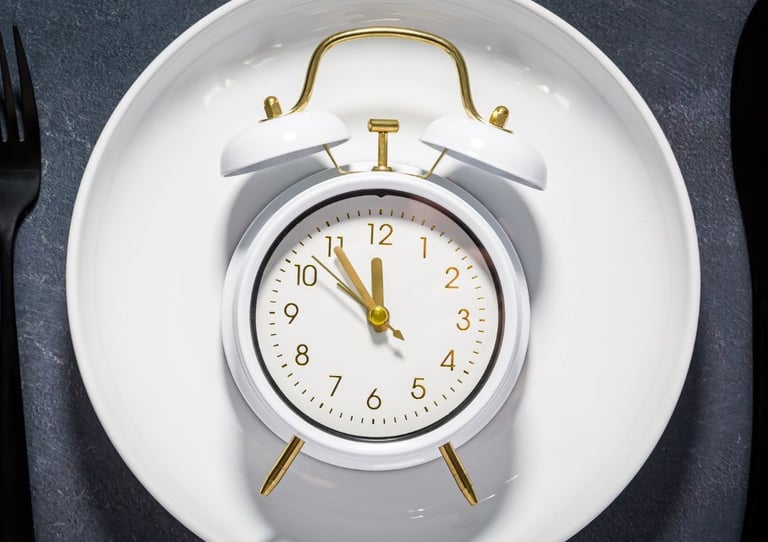Why Fasting Does Not Seem to Help Your Weight Loss Plan


So, it’s fasting season. At the start of the year, many churches that I know call a fast for their brethren. Some fasts are the Daniel fasts, which is 21 days without food, only liquids. Some are partial fasts, where participants fast off breakfasts and lunches and eat only dinners. This article is mainly for people who do partial religious fasts, and those who do intermittent fasting for weight loss.
The expectation a lot of people have is that when they are undergoing some sort of intermittent fasting, they will lose drastic weight automatically. It becomes a shock when after the period of fasting, they realize that their either did not lose weight or lost only a little weight and are very quick to gain all the weight back a few days after the fast is over.
Here are some reasons for this:
ONE: You are eating too much in your eating window
The fact that you are fasting does not mean you should eat too much. Remember, you only lose weight when the calories you are consuming are less than the calories you are burning. If you eat more, even if it’s in one meal, you’ll gain weight.
What should you do? Even though you’re fasting, continue to count your calories. If you do this enough times, you will not need the measuring cups and scale as much again.
TWO: You’re eating too little
Ironic, right? One thing we need to know is that our bodies were created to run perfectly with only little input needed from us. Whether or not we get up from our beds, our bodies will need energy (calories) to function. It’s called the Basal Metabolic Rate (BMR). The BMR differs depending on how big you are; because the bigger you are, the more energy you’ll need to function. Now, when you’re fasting partially or intermittently and you do not feed your body the regular quantity of food, your body may not respond or react to it on the first or second day, but by the third or fourth day, your body will react; and the reaction is to conserve energy because it is being starved. So, you will start out losing some weight (especially water, not fat, weight), but soon enough your body will be reluctant to let go of that fat weight.
What should you do? During your eating window through your fast, make sure you eat at least 1200 calories, depending on your level of physical activity. It should not be in one meal. If you’re having one big meal during your eating window, add more calories by eating healthy snacks.
THREE: You’re eating junk
You should know this. Calories differ in quality. Even though a handful of peanuts (30g) have 170 calories, and calories in 30g sugar are only 116, peanuts are still better and healthier. This is because our bodies process healthy foods differently from unhealthy foods. Simple sugars and processed fat are absorbed easier and quicker in our bodies than fiber-filled foods. About 10-15% of calories in fiber-packed foods aren’t absorbed by the body. The body also utilizes more calories when metabolizing fiber rich and whole foods than when breaking down simple sugars and processed foods. In addition, our bodies build and retain muscle mass when we eat high fiber, high protein and highly nutritious foods, while our bodies lose muscle mass when we eat junk. The more muscle mass you have, the more calories you burn even without do any extra work. This is why strength exercises are recommended when you’re on a weight loss program. So, you see, if you eat junk during partial or intermittent fasts, even if you’re still within your calorie bracket, you may not lose weight as you would like to. In addition, when you eat all your calories in one junk meal, you will feel hungrier quickly and risk the chance of jeopardizing your partial or intermittent fasting program. When you eat highly nutritious, fiber-packed foods, you get to eat more food with less calories and you feel fuller. You’ll likely go through your fasting program more successfully and feel good about yourself throughout.
What should you do? Eat healthily throughout your fasting period. Since you’re going to have one meal and a few snacks, make them worth the while.
FOUR: Your eating window is longer than your fasting window
To be able to lose weight during partial or intermittent fasts, you should be able to fast long enough. If your eating window is too long, you’ll likely go through meals as you would on a day you’re not fasting, meaning that you will not lose weight. Or you will even gain, because there may be a higher tendency to eat more than usual, because your head will keep telling you that “you can have more, you know you’re fasting”.
What should you do? Have at least 14 hours of fasting window and 10 hours eating window and be sure to eat less than you normally would; but healthy choices.
FIVE: You went back to your regular eating pattern right after fasting
Now fasting is over and you’ve actually lost some weight. That’s great. However, the weight lost will come creeping right back if you immediately pick up your previous not-so-healthy eating habits.
What should you do? Even though it is expected that you will gain some weight after returning to 3 meals a-day, you can control how much you gain by maintaining some good habits that the fasting period should have helped you form, such as eating only when hungry, selecting the best, healthiest and nutritious foods to eat, counting your calories, eating enough calories, but not eating too much, etc.
How much calories should you eat daily? Find out here...




